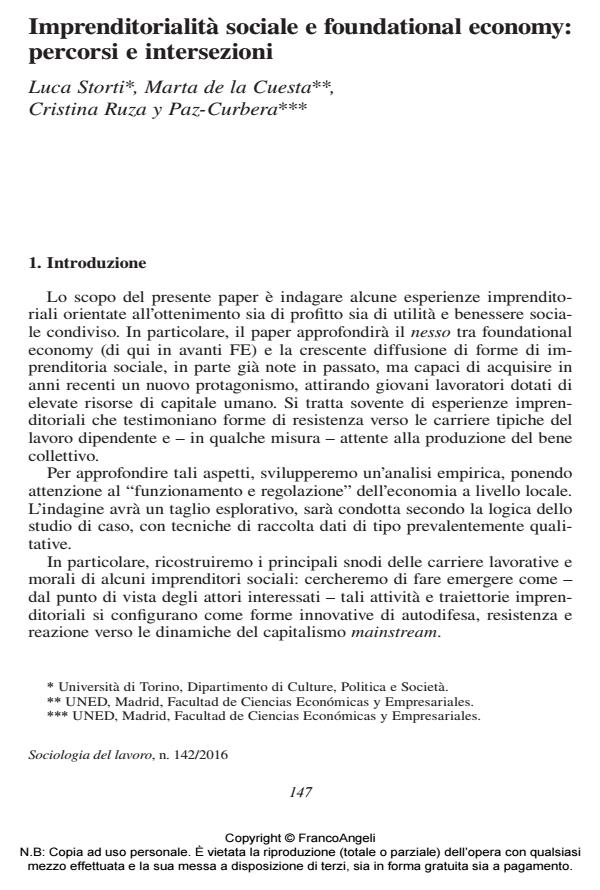Social entrepreneurship and foundational economy: path and overlapping
Journal title SOCIOLOGIA DEL LAVORO
Author/s Luca Storti, Marta de la Cuesta, Cristina Ruza y Paz-Curbera
Publishing Year 2016 Issue 2016/142
Language Italian Pages 17 P. 147-163 File size 123 KB
DOI 10.3280/SL2016-142009
DOI is like a bar code for intellectual property: to have more infomation
click here
Below, you can see the article first page
If you want to buy this article in PDF format, you can do it, following the instructions to buy download credits

FrancoAngeli is member of Publishers International Linking Association, Inc (PILA), a not-for-profit association which run the CrossRef service enabling links to and from online scholarly content.
The authors investigate the relationship between foundational economy and several innovative experiences of social entrepreneurship. A phenomenon that in recent years has gained a new impetus. To this end, the authors assume an analytical perspective by taking into account the micro economic regulation processes at a local level. The research is exploratory in nature, it uses a case study approach and qualitative techniques. The authors takes into consideration the Spanish case, as characterized by the presence of extensive network of social entrepreneurs, in the fields of collective, common and environmental goods, utilities and grassroots. The authors reconstruct the accountability strategies of the entrepreneurs through semi-structured interviews. It will be observed "how" they represent their business practices as: i) experience of self-defense, by facing several acquisitive processes of goods and common resources; ii) initiatives that provide a social utility; iii) participative and horizontal form of work division.
Keywords: Entrepreneurship, social entrepreneurship, foundational economy, collective action, regulation, innovation
- King N. (1988). Template Analysis. In: Symon G., Cassel C., a cura di, Qualitative Methods in Organizational Research: A Practical Guide. Thousand Oaks: Sage, pp. 118-134.
- Mair J., Martí I. (2006). Social Entrepreneurship research: a source of explanation, prediction, and delight. Journal of World Business, 41(1): 36-44.
- Martin R.L., Osberg S. (2007). Social entrepreneurship: The case for definition. Stanford Social Innovation Review, 5: 29-39.
- Navarro A.M., Campos Climent V., Sanchis Palacio J.R. (2011). Emprendimiento social y empresas de inserción en España. Aplicación del método delphi para la determinación del perfil del emprendedor y las empresas sociales creadas por emprendedores. Revesco Revista de estudios Cooperativos, 106: 150-172.
- Phills J.A. Jr., Deiglmeier K., Miller D.T. (2008). Rediscovering social innovation. Stanford Social Innovation Review, 6, Fall: 34-43.
- Smith N. (1979). Toward a theory of gentrification: a back to the City movement by Capital, not people. APA Journal, October: 538-548.
- Vedres B., Stark D. (2010). Structural Folds: Generative Disruption of in Overlapping Groups. American Journal of Sociology, 115(4): 1150-1190.
- AECA (2015). La empresa social: marco conceptual, conexto e información. Documentos Aeca. Serie Responsabilidad Social Corporativa, Documento n. 9.
- Ashoka (2010). Ashoka fellows changing systems. Global Study 2009. Disponible en: http://sfs.ashoka.org/sites/sfs/files/2010%20Ashoka%20Impact%20Study.pdf.
- Austin J., Stevenson H., Wei-Skillern J. (2006). Social and commercial entrepreneurship: same, different or both? Entrepreneurship Theory and Practice, 30: 1-22.
- Bacq S., Janssen F. (2011). The multiple faces of social entrepreneurship: A review of definitional issues based on geographical and thematic criteria. Entrepreneurship & Regional Development, 23(5-6): 373-403. Becker G. (1996). Accounting for tastes. Cambridge, Mass.: Harvard University Press.
- Bellanca N. (2007). L’economia del noi. Dall’azione collettiva alla partecipazione politica. Milano: UBE.
- Bentham J., Bowman A., Froud J., Johal S., Leaver A., Williams K. (2013), Against New Industrial Strategy: Framing, Motifs and Absences. Working Paper 126, University of Manchester: CRESC. www.cresc.ac.uk/people/profjulie-froud.
- Bowman A., Ertürk I., Froud J., Johal S., Law J., Leaver A., Moran M., Williams K. (2014). The end of the experiment? From competition to the foundational economy. New York: Pelgrave.
- Cardano M. (2011). La ricerca qualitative. Bologna: il Mulino.
- Cepees (2013). El Emprendimiento social como parte de la economia social. www.cepes.es/publicacion_cepes=100 (accesso: giugno 2015).
- Crouch C. (2011). The Strange Non-death of Neo-liberalism. Cambridge: Polity.
- Dees G. (1996). The social enterprise spectrum: from philanthropy to commerce. Boston: Harvard Business School Publishing Division.
- Dees J.G. (1998). The meaning of social entrepreneurship. Fuqua Business School working, paper disponibile: www.fuqua.duke.edu/centers/case/documents/dees_SE.pdf.
- Defourny J., Nyssens M. (2010). Social enterprise in Europe: At the crossroads of market, public policies and third sector. Policy and Society, 29: 231-242.
- García-Gutiérrez Fernández C., Lejarriaga Pérez de las Vacas G., Bel durán P., Fernández Guadaño J., Martín López S. (2008). El emprendimiento y el empleo a través de la empresa individual: contraste de fuentes estadísticas. Revesco, n. 96, tercer cuatrimestre.
- Hall P., Soskice D. (2001). Varieties of Capitalism: The Institutional Foundations of Comparative Advantage. Oxford: Oxford University Press.
Luca Storti, Marta de la Cuesta, Cristina Ruza y Paz-Curbera, Imprenditorialità sociale e foundational economy: percorsi e intersezioni in "SOCIOLOGIA DEL LAVORO " 142/2016, pp 147-163, DOI: 10.3280/SL2016-142009